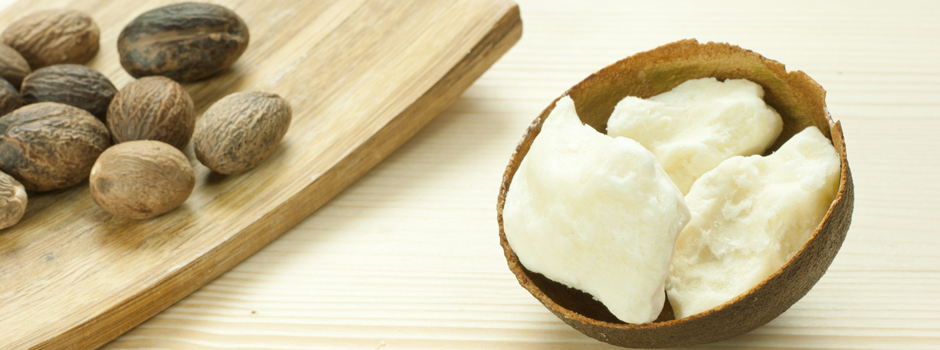Ingredients
YOU CAN’T BEAT THE NATURAL
 Cold pressed method is one of the best methods to extract oils. It is a method of mechanical extraction. No external heat is required to let the process go, rather the high temperature to carry out the process is obtained internally. Though it is not considered a practical method of extraction for all vegetable oils, it is highly regarded as the extraction method of choice. Production starts with the nuts, seeds, or fruits being used to make the product being ground into an even paste. This is slowly stirred, which encourages the oil to separate from the solid parts and clump together; once this happens, pressure is applied, forcing the oil out. This can be done with a machine or in the traditional way, with a stone. Though the friction caused by the pressure does increase the temperature of the product, manufacturers must keep it within a certain degree range to be able to claim that the oil is cold pressed. Cold pressed oil may be healthier than conventionally made oil because of the lack of heat and chemicals in the production process. In conventional extraction, raw materials are heated to very high temperatures, sometimes up to 450°F (around 230°C), which changes their chemical structure. They are also often made with chemicals like hexane, a solvent which can cause health problems.
Cold pressed method is one of the best methods to extract oils. It is a method of mechanical extraction. No external heat is required to let the process go, rather the high temperature to carry out the process is obtained internally. Though it is not considered a practical method of extraction for all vegetable oils, it is highly regarded as the extraction method of choice. Production starts with the nuts, seeds, or fruits being used to make the product being ground into an even paste. This is slowly stirred, which encourages the oil to separate from the solid parts and clump together; once this happens, pressure is applied, forcing the oil out. This can be done with a machine or in the traditional way, with a stone. Though the friction caused by the pressure does increase the temperature of the product, manufacturers must keep it within a certain degree range to be able to claim that the oil is cold pressed. Cold pressed oil may be healthier than conventionally made oil because of the lack of heat and chemicals in the production process. In conventional extraction, raw materials are heated to very high temperatures, sometimes up to 450°F (around 230°C), which changes their chemical structure. They are also often made with chemicals like hexane, a solvent which can cause health problems.
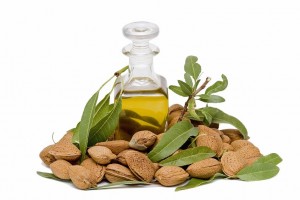
ALMOND OIL oil is pressed from the dried kernel of sweet almonds and is rich in omega-9 and omega-6 fatty acids. Traditionally used by massage therapists to enhance their client’s experience, it also makes the external layers of skin softer and more pliable. It increases skin’s moisture level by limiting evaporation and is rich in Vitamin E and other nutrient rich lipids.
Sweet Almond Carrier Oil is an excellent emollient and is known for its ability to soften and re-condition the skin. It is rich in proteins, Olein Glyceride Linoleic Acid and Vitamin D, and is considered extremely nourishing – particularly when used regularly. It can be expected to sooth dry skin and irritated areas. Massage therapists should note that it can stain sheets.
Almond oil doesn’t penetrate skin as deeply as other oils and therefore is perfect for aromatherapy.
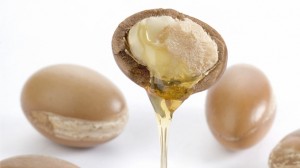 ARGAN OIL is produced from the kernels of the tree and is one of the rarest and most expensive oils in the world. Berber women have used Argan oil for centuries to protect and nourish their skin, hair and nails from the harsh conditions in which they live. Now Argan oil is gaining popularity as a “miracle ingredient” in the Western beauty product industry. It has extremely high levels of Vitamin E and 80% fatty acids which make it perfect for healing many skin ailments as well as protecting against premature aging caused by oxidation. Argan Oil has been shown to reduce the appearance of fine lines and wrinkles, strengthen elasticity, protect against stretch marks, and improve your skin’s overall health and vitality. Traditionally, the women of Morocco have utilized argan oil as the foundation of their beauty regimen, applying it to their skin, hair and nails. Recognized as a fundamental element in cosmetic care, argan oil is now being used in several beauty products. Researchers who have completed extensive studies identify the benefits of our oils and strongly recommend its cosmetic use. The combination of traditional values and scientific expertise has yielded an inventory of several amazing active ingredients from the argan plant. Not only are these components beneficial to the skin’s overall structure and elasticity, but are beneficial to the environment as well; they are produced sustainably and traded fairly. Argan Oil is food for your skin. Similar to your body’s inherent need for nourishment, your skin must be replenished and fed in order to remain healthy. Due to environmental stress, your skin is constantly being deprived of the nutrients needed to maintain its necessary levels of hydration and collagen. Argan Oils is a natural solution to defend the skin against premature aging and UV exposure.
ARGAN OIL is produced from the kernels of the tree and is one of the rarest and most expensive oils in the world. Berber women have used Argan oil for centuries to protect and nourish their skin, hair and nails from the harsh conditions in which they live. Now Argan oil is gaining popularity as a “miracle ingredient” in the Western beauty product industry. It has extremely high levels of Vitamin E and 80% fatty acids which make it perfect for healing many skin ailments as well as protecting against premature aging caused by oxidation. Argan Oil has been shown to reduce the appearance of fine lines and wrinkles, strengthen elasticity, protect against stretch marks, and improve your skin’s overall health and vitality. Traditionally, the women of Morocco have utilized argan oil as the foundation of their beauty regimen, applying it to their skin, hair and nails. Recognized as a fundamental element in cosmetic care, argan oil is now being used in several beauty products. Researchers who have completed extensive studies identify the benefits of our oils and strongly recommend its cosmetic use. The combination of traditional values and scientific expertise has yielded an inventory of several amazing active ingredients from the argan plant. Not only are these components beneficial to the skin’s overall structure and elasticity, but are beneficial to the environment as well; they are produced sustainably and traded fairly. Argan Oil is food for your skin. Similar to your body’s inherent need for nourishment, your skin must be replenished and fed in order to remain healthy. Due to environmental stress, your skin is constantly being deprived of the nutrients needed to maintain its necessary levels of hydration and collagen. Argan Oils is a natural solution to defend the skin against premature aging and UV exposure.
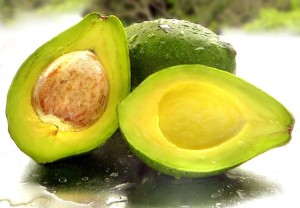 AVOCADO OIL which comes from the pressed flesh of avocado fruits, is a darling of the healthy food scene thanks to its many health benefits. New research suggests it’s effective in fighting off free radicals, the molecules responsible for cell damage and aging. Avocado oil is also high in dietary vitamin E, which can help boost immunity and promote healthy skin. It can help (skin) smoothness and decrease the effects of oxidative stress in the environment. The antioxidant properties of avocado oil can also help boost heart health. Like olive oil, avocado oil is rich in healthy monounsaturated fat, which can help lower the levels of bad (LDL) cholesterol in your blood and decrease risk for cardiovascular disease. It prevents the oxidation process that the LDL needs to survive. Avocado oil contains a high amount of proteins and unsaturated fats, both of which are strong skin agents. Avocado oil actually contains omega-3 fatty acids – those very same fatty acids as found in fish oil. Avocado oil is high in a substance called sterolin, which studies have shown to facilitate the softening of the skin and to reduce the incidence of age spots. This oil is rich in antioxidants, making it useful for healing sun-damaged skin. Antioxidants like vitamins A, D and E in avocado cause the skin to be suppler, and are thus particularly good for dry or aged skin.
AVOCADO OIL which comes from the pressed flesh of avocado fruits, is a darling of the healthy food scene thanks to its many health benefits. New research suggests it’s effective in fighting off free radicals, the molecules responsible for cell damage and aging. Avocado oil is also high in dietary vitamin E, which can help boost immunity and promote healthy skin. It can help (skin) smoothness and decrease the effects of oxidative stress in the environment. The antioxidant properties of avocado oil can also help boost heart health. Like olive oil, avocado oil is rich in healthy monounsaturated fat, which can help lower the levels of bad (LDL) cholesterol in your blood and decrease risk for cardiovascular disease. It prevents the oxidation process that the LDL needs to survive. Avocado oil contains a high amount of proteins and unsaturated fats, both of which are strong skin agents. Avocado oil actually contains omega-3 fatty acids – those very same fatty acids as found in fish oil. Avocado oil is high in a substance called sterolin, which studies have shown to facilitate the softening of the skin and to reduce the incidence of age spots. This oil is rich in antioxidants, making it useful for healing sun-damaged skin. Antioxidants like vitamins A, D and E in avocado cause the skin to be suppler, and are thus particularly good for dry or aged skin.
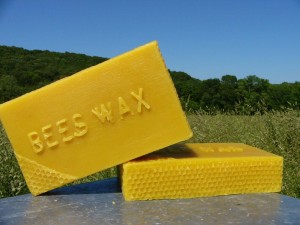 BEESWAX is a colorless liquid secreted by female worker bees as they build the honeycomb walls.The wax is secreted from wax glands on the underside of the bee’s abdomen and is molded into six-sided cells which are filled with honey, then capped with more wax. When honey is harvested, the top layer of wax that covers the cells, or the cappings, must be removed from each hexagon-shaped cell. Beeswax is known to lock in moisture, foster cells, and protect skin from damaging environmental factors. Beeswax effectively softens skin and creates a long-lasting protective coating against the elements. It also is a naturally nourishing moisturizer. Beeswax’s anti-inflammatory, antibacterial, anti-allergenic, and germicidal antioxidant properties make it beneficial for wound healing. Even after processing, beeswax still remains a biologically active product, retaining some anti-bacterial properties. It is reported that beeswax contains some vitamin A, which is necessary for normal cell development.
BEESWAX is a colorless liquid secreted by female worker bees as they build the honeycomb walls.The wax is secreted from wax glands on the underside of the bee’s abdomen and is molded into six-sided cells which are filled with honey, then capped with more wax. When honey is harvested, the top layer of wax that covers the cells, or the cappings, must be removed from each hexagon-shaped cell. Beeswax is known to lock in moisture, foster cells, and protect skin from damaging environmental factors. Beeswax effectively softens skin and creates a long-lasting protective coating against the elements. It also is a naturally nourishing moisturizer. Beeswax’s anti-inflammatory, antibacterial, anti-allergenic, and germicidal antioxidant properties make it beneficial for wound healing. Even after processing, beeswax still remains a biologically active product, retaining some anti-bacterial properties. It is reported that beeswax contains some vitamin A, which is necessary for normal cell development.
 CALENDULA also known as Pot Marigold, has been used for centuries to heal wounds and skin irritations. Calendula has anti-inflammatory, antimicrobial, astringent, antifungal, antiviral, and immunostimulant properties making it useful for disinfecting and treating minor wounds, conjunctivitis, cuts, scrapes, chapped or chafed skin, bruises, burns, athlete’s foot, acne, yeast infections, bee stings, diaper rashes, and other minor irritations and infections of the skin. Plus, it stimulates the production of collagen at wound sites to help minimize scarring and assist with stretch marks. This versatile botanical can be incorporated into baths, creams, compresses, washes, salves, ointments, massage oils, baths, facial steams, tinctures, and teas. It is also gentle enough to use for babies, children, or animals. Internally, gargling with Calendula infused water may ease a sore throat, sores in the mouth, and inflammations in the mouth and throat. Whether your issues are dermatitis, eczema, diaper rash or irritated dry skin, calendula will bring relief and health back to your world. Especially great for healing burns, and minor cuts and scrapes, the magic in the marigold has been used as far back as ancient times. Relief from inflammation has a positive effect on hundreds of skin ailments even allowing the slower spread of some skin diseases. In the world of essential oils Calendula is considered to be one of the most powerful contenders as a therapeutic remedy. Due to the anti-fungal properties of calendula it can be used to treat ringworm and athletes foot. The high content of antioxidants found in Calendula oil contributes to the cell regeneration aspect of the oil. Some of these antioxidants are mucilage, carotenoids, saponin, and quercetin. Babies have very soft skin, and sometimes their skin is very sensitive at this early stage of life. Calendula oil is wonderful to use on diaper rash. Diaper rash can be extremely irritating for a baby or an infant to deal with, and the oil can provide a huge relief.
CALENDULA also known as Pot Marigold, has been used for centuries to heal wounds and skin irritations. Calendula has anti-inflammatory, antimicrobial, astringent, antifungal, antiviral, and immunostimulant properties making it useful for disinfecting and treating minor wounds, conjunctivitis, cuts, scrapes, chapped or chafed skin, bruises, burns, athlete’s foot, acne, yeast infections, bee stings, diaper rashes, and other minor irritations and infections of the skin. Plus, it stimulates the production of collagen at wound sites to help minimize scarring and assist with stretch marks. This versatile botanical can be incorporated into baths, creams, compresses, washes, salves, ointments, massage oils, baths, facial steams, tinctures, and teas. It is also gentle enough to use for babies, children, or animals. Internally, gargling with Calendula infused water may ease a sore throat, sores in the mouth, and inflammations in the mouth and throat. Whether your issues are dermatitis, eczema, diaper rash or irritated dry skin, calendula will bring relief and health back to your world. Especially great for healing burns, and minor cuts and scrapes, the magic in the marigold has been used as far back as ancient times. Relief from inflammation has a positive effect on hundreds of skin ailments even allowing the slower spread of some skin diseases. In the world of essential oils Calendula is considered to be one of the most powerful contenders as a therapeutic remedy. Due to the anti-fungal properties of calendula it can be used to treat ringworm and athletes foot. The high content of antioxidants found in Calendula oil contributes to the cell regeneration aspect of the oil. Some of these antioxidants are mucilage, carotenoids, saponin, and quercetin. Babies have very soft skin, and sometimes their skin is very sensitive at this early stage of life. Calendula oil is wonderful to use on diaper rash. Diaper rash can be extremely irritating for a baby or an infant to deal with, and the oil can provide a huge relief.
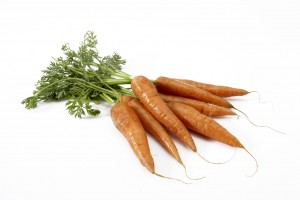 CARROT OIL is a golden coloured extract from carrots with extraordinary skin protection and conditioning benefits derived from the high quantities of oil soluble carotenoids that it contains. Carotenoids are a class of easily assimilated antioxidants, which are present in a wide range of fruits and vegetables but most abundant in carrots. Antioxidants protect human cells from harmful free-radical attack. Free-radicals are stray oxygen molecules that attack healthy cell walls and react with polyunsaturated fats to create a chain reaction of unlimited free-radical regeneration. Free-radicals are produced by a wide range of environmental pollutants, including UVR. If left unchecked by antioxidants, free-radicals damage both the structure and function of cell membranes, resulting in premature aging. In addition to carotenoids, Carrot Oil contains other powerful antioxidants such as tocopheryl, or vitamin E. Studies have shown that topical application of vitamin E may directly reduce many harmful effects of UVR, enhance skin immunity and help heal a sunburn.
CARROT OIL is a golden coloured extract from carrots with extraordinary skin protection and conditioning benefits derived from the high quantities of oil soluble carotenoids that it contains. Carotenoids are a class of easily assimilated antioxidants, which are present in a wide range of fruits and vegetables but most abundant in carrots. Antioxidants protect human cells from harmful free-radical attack. Free-radicals are stray oxygen molecules that attack healthy cell walls and react with polyunsaturated fats to create a chain reaction of unlimited free-radical regeneration. Free-radicals are produced by a wide range of environmental pollutants, including UVR. If left unchecked by antioxidants, free-radicals damage both the structure and function of cell membranes, resulting in premature aging. In addition to carotenoids, Carrot Oil contains other powerful antioxidants such as tocopheryl, or vitamin E. Studies have shown that topical application of vitamin E may directly reduce many harmful effects of UVR, enhance skin immunity and help heal a sunburn.
 CHAMOMILE (German) essential oil is extracted from Matricaria chamomilla (M. recutica) of the same family and is also known by the names of blue chamomile, Hungarian chamomile and single chamomile. Both Roman and German chamomile have excellent calming properties, but Roman chamomile is more effective for irritation, impatience and feeling disagreeable, and has great value in treating PMS and other menstrual and menopausal problems, while German chamomile is superbly effective on the skin, not only to sooth and calm, but to heal and for tissue regeneration. Both chamomile oils are extracted from the flowers by steam distillation, with the Roman chamomile yielding about 1.7 % from fresh flowers and German chamomile yielding about 0.2 – 0.4 %. Chamomile is a flowering plant that has been used for centuries for its astounding medicinal properties. A naturally occurring substance in chamomile is coumarin and this active ingredient renders the potent anti- inflammatory and blood thinning attributes that chamomile is famous for. German chamomile is the most common chamomile. It has been studied and used extensively in creams, lotions, perfumes, and teas. Roman chamomile is less popular than its German counterpart. It is also known as English chamomile and exhibits similar health benefits. Roman chamomile is available as tea bags, tinctures, aromatic oils, and in a dried form. Traditionally brewed like tea, chamomile leaves have therapeutic uses and help relieve muscular cramps, soothe the digestive system, and treat several skin conditions.
CHAMOMILE (German) essential oil is extracted from Matricaria chamomilla (M. recutica) of the same family and is also known by the names of blue chamomile, Hungarian chamomile and single chamomile. Both Roman and German chamomile have excellent calming properties, but Roman chamomile is more effective for irritation, impatience and feeling disagreeable, and has great value in treating PMS and other menstrual and menopausal problems, while German chamomile is superbly effective on the skin, not only to sooth and calm, but to heal and for tissue regeneration. Both chamomile oils are extracted from the flowers by steam distillation, with the Roman chamomile yielding about 1.7 % from fresh flowers and German chamomile yielding about 0.2 – 0.4 %. Chamomile is a flowering plant that has been used for centuries for its astounding medicinal properties. A naturally occurring substance in chamomile is coumarin and this active ingredient renders the potent anti- inflammatory and blood thinning attributes that chamomile is famous for. German chamomile is the most common chamomile. It has been studied and used extensively in creams, lotions, perfumes, and teas. Roman chamomile is less popular than its German counterpart. It is also known as English chamomile and exhibits similar health benefits. Roman chamomile is available as tea bags, tinctures, aromatic oils, and in a dried form. Traditionally brewed like tea, chamomile leaves have therapeutic uses and help relieve muscular cramps, soothe the digestive system, and treat several skin conditions.
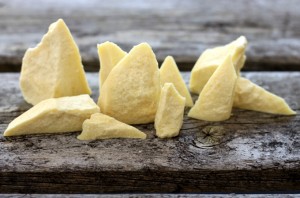 CACAO BUTTER is the cream-colored fat extracted from cacao seeds (cocoa beans) and used to add flavor, scent, and smoothness to chocolate, cosmetics, tanning oil, soap, and a multitude of topical lotions and creams. Cocoa Butter has been called the ultimate moisturizer, and has been used to keep skin soft and supple for centuries. It is one of the most stable, highly concentrated natural fats known, and melts at body temperature so that it is readily absorbed into the skin. Cocoa Butter is often recommended for treatment of skin conditions such as eczema and dermatitis. When applied topically, it creates a barrier between sensitive skin and the environment and also helps retain moisture. In addition, Cocoa Butter contains cocoa mass polyphenol (CMP), a substance that inhibits the production of the immuno globulin IgE. IgE is known to aggravate symptoms of both dermatitis and asthma. Cocoa butter contains a large proportion of minerals including calcium, potassium, magnesium, zinc, manganese, copper and iron, all of which are in a highly bioavailable form that render them more effective than commercial vitamin supplements. It is brain food as well as food for your skin. Cocoa Butter contains a number of different antioxidants that can kill off a wide range of different free radicals that destroy your skin cells and lead to premature aging. This makes it an ideal skin care product. Free radicals destroy cells. They are organic molecules responsible for aging, tissue damage, and possibly some diseases. These molecules are very unstable, therefore they look to bond with other molecules, destroying their vigor and perpetuating the detrimental process. They do this through a process known as oxidation, which antioxidants can prevent. Cocoa Butter contains Vitamin E, which is a strong antioxidant – the strongest of all the antioxidant vitamins in fact, and can easily kill off hydrogen peroxide and any other oxidizing agent. It also contains phytochemicals (plant chemicals) such as flavanoids that are also strong antioxidants. Polyphenols are very effective at neutralizing free radicals, and the cocoa mass polyphenols are particularly effective. In fact, Cocoa Butter contains a much higher antioxidant concentration then even blueberries and other so-called superfoods.
CACAO BUTTER is the cream-colored fat extracted from cacao seeds (cocoa beans) and used to add flavor, scent, and smoothness to chocolate, cosmetics, tanning oil, soap, and a multitude of topical lotions and creams. Cocoa Butter has been called the ultimate moisturizer, and has been used to keep skin soft and supple for centuries. It is one of the most stable, highly concentrated natural fats known, and melts at body temperature so that it is readily absorbed into the skin. Cocoa Butter is often recommended for treatment of skin conditions such as eczema and dermatitis. When applied topically, it creates a barrier between sensitive skin and the environment and also helps retain moisture. In addition, Cocoa Butter contains cocoa mass polyphenol (CMP), a substance that inhibits the production of the immuno globulin IgE. IgE is known to aggravate symptoms of both dermatitis and asthma. Cocoa butter contains a large proportion of minerals including calcium, potassium, magnesium, zinc, manganese, copper and iron, all of which are in a highly bioavailable form that render them more effective than commercial vitamin supplements. It is brain food as well as food for your skin. Cocoa Butter contains a number of different antioxidants that can kill off a wide range of different free radicals that destroy your skin cells and lead to premature aging. This makes it an ideal skin care product. Free radicals destroy cells. They are organic molecules responsible for aging, tissue damage, and possibly some diseases. These molecules are very unstable, therefore they look to bond with other molecules, destroying their vigor and perpetuating the detrimental process. They do this through a process known as oxidation, which antioxidants can prevent. Cocoa Butter contains Vitamin E, which is a strong antioxidant – the strongest of all the antioxidant vitamins in fact, and can easily kill off hydrogen peroxide and any other oxidizing agent. It also contains phytochemicals (plant chemicals) such as flavanoids that are also strong antioxidants. Polyphenols are very effective at neutralizing free radicals, and the cocoa mass polyphenols are particularly effective. In fact, Cocoa Butter contains a much higher antioxidant concentration then even blueberries and other so-called superfoods.
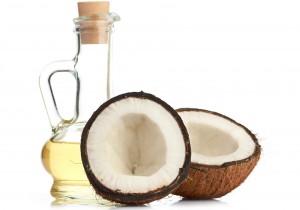 COCONUT OIL is an edible oil extracted from the kernel or meat of matured coconuts harvested from the coconut palm. It has various applications in food, medicine, and industry. Because of its high saturated fat content it is slow to oxidize and, thus, resistant to rancidification, lasting up to two years without spoiling. The size of the fatty acid is extremely important. Why? Because our bodies respond to and metabolize each fatty acid differently depending on its size. So the physiological effects of MCFA in coconut oil are distinctly different from those of LCFA more commonly found in our foods. The saturated fatty acids in coconut oil are predominately medium-chain fatty acids. Both the saturated and unsaturated fat found in meat, milk, eggs, and plants (including most all vegetable oils) are composed of LCFA. Some coconut oil products are referred to as “virgin” coconut oil. Unlike olive oil, there is no industry standard for the meaning of “virgin” coconut oil. The term has come to mean that the oil is generally unprocessed. For example, virgin coconut oil usually has not been bleached, deodorized, or refined. Organic Coconut Oil is rich in vitamins and minerals and especially rich (60%+) in important fatty acids, the medium chain triglycerides (MCTs). It has been used by Asian and Pacific populations both as a source of dietary oil and in their traditional medical practices. Praised for its many and various healing properties, to a Pacific Islander, Coconut Oil is believed to be the cure of all illnesses and is so highly valued they refer to the coconut palm as “The Tree of Life.”
COCONUT OIL is an edible oil extracted from the kernel or meat of matured coconuts harvested from the coconut palm. It has various applications in food, medicine, and industry. Because of its high saturated fat content it is slow to oxidize and, thus, resistant to rancidification, lasting up to two years without spoiling. The size of the fatty acid is extremely important. Why? Because our bodies respond to and metabolize each fatty acid differently depending on its size. So the physiological effects of MCFA in coconut oil are distinctly different from those of LCFA more commonly found in our foods. The saturated fatty acids in coconut oil are predominately medium-chain fatty acids. Both the saturated and unsaturated fat found in meat, milk, eggs, and plants (including most all vegetable oils) are composed of LCFA. Some coconut oil products are referred to as “virgin” coconut oil. Unlike olive oil, there is no industry standard for the meaning of “virgin” coconut oil. The term has come to mean that the oil is generally unprocessed. For example, virgin coconut oil usually has not been bleached, deodorized, or refined. Organic Coconut Oil is rich in vitamins and minerals and especially rich (60%+) in important fatty acids, the medium chain triglycerides (MCTs). It has been used by Asian and Pacific populations both as a source of dietary oil and in their traditional medical practices. Praised for its many and various healing properties, to a Pacific Islander, Coconut Oil is believed to be the cure of all illnesses and is so highly valued they refer to the coconut palm as “The Tree of Life.”
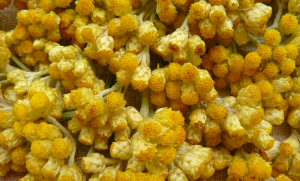 IMMORTELLE OIL may very well be one of the rarest, most powerful oils on this planet. This extremely scarce, precious blend is wild-harvested only in the high altitude rocky cliffs of the Italian and Croatian coasts. It is the number one healing oil. There are cases where it was applied directly to open wounds. As wonderful as the essential oil of Helichrysum is, it is not commonly seen in many beauty products- it is very expensive ($4.500- $5.000 per liter).
IMMORTELLE OIL may very well be one of the rarest, most powerful oils on this planet. This extremely scarce, precious blend is wild-harvested only in the high altitude rocky cliffs of the Italian and Croatian coasts. It is the number one healing oil. There are cases where it was applied directly to open wounds. As wonderful as the essential oil of Helichrysum is, it is not commonly seen in many beauty products- it is very expensive ($4.500- $5.000 per liter).
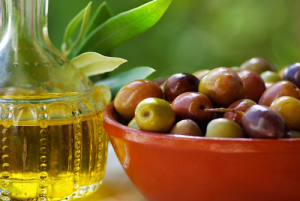 JOJOBA OIL is the oil extracted from the beanlike seeds of the desert shrub Simmondsia chinensis. The female variety of the plant produces a fruit, which in turn bears a seed containing a liquid wax. This oily wax is similar to vegetable oil, and is considered “unusually” pure. It contains essentially all-wax esters, Vitamin E, and phospholipids. Jojoba oil has a few distinct characteristics that make it so wonderful. It’s very similar to sebum- the oil that humans secrete to lubricate skin and hair- and can be used as a sebum substitution for people with decreased production. Conversely, it can also be used to remove excess sebum and product buildup on hair. Jojoba is also a powerful moisturizer, and is sometimes used as a perfume base. It’s antibacterial, anti-inflammatory, hypoallergenic, non-toxic and non-comedogenic. In dermatological tests done, using jojoba oil, by Christensen and Packman, it was shown that jojoba oil increases the skin’s suppleness by 45% and after 8 hours the effect was still present.It was also found that jojoba oil softens and smoothes the skin with fine line reduction. In one test 20 women’s skin compliance increased with 37% after 30 minutes and remained for a hour.Continued use of jojoba oil results in reducing superficial facial lines. Reduction of such lines was 26%, 18% and 11% after 1, 4 and 8 hours in conducted tests. Jojoba oil was also tested for hypoallergenic reactions. Two out of 50 people with known allergic skin types showed reactions to Jojoba. This reaction on the inherently hyper-allergic skins cleared completely after 24 hours.Tests at Michigan University showed that five of the most common skin bacteria plus certain skin fungi couldn’t survive in jojoba oil. Professor Zille of Port Elizabeth University carried out studies on the anti-bacterial effects of jojoba oil and the results were presented at a Coshem Congress held in Mintek, which found that jojoba oil destroys the bacteria staphylococcus and pseudomonas within 1 hour and 15 minutes.
JOJOBA OIL is the oil extracted from the beanlike seeds of the desert shrub Simmondsia chinensis. The female variety of the plant produces a fruit, which in turn bears a seed containing a liquid wax. This oily wax is similar to vegetable oil, and is considered “unusually” pure. It contains essentially all-wax esters, Vitamin E, and phospholipids. Jojoba oil has a few distinct characteristics that make it so wonderful. It’s very similar to sebum- the oil that humans secrete to lubricate skin and hair- and can be used as a sebum substitution for people with decreased production. Conversely, it can also be used to remove excess sebum and product buildup on hair. Jojoba is also a powerful moisturizer, and is sometimes used as a perfume base. It’s antibacterial, anti-inflammatory, hypoallergenic, non-toxic and non-comedogenic. In dermatological tests done, using jojoba oil, by Christensen and Packman, it was shown that jojoba oil increases the skin’s suppleness by 45% and after 8 hours the effect was still present.It was also found that jojoba oil softens and smoothes the skin with fine line reduction. In one test 20 women’s skin compliance increased with 37% after 30 minutes and remained for a hour.Continued use of jojoba oil results in reducing superficial facial lines. Reduction of such lines was 26%, 18% and 11% after 1, 4 and 8 hours in conducted tests. Jojoba oil was also tested for hypoallergenic reactions. Two out of 50 people with known allergic skin types showed reactions to Jojoba. This reaction on the inherently hyper-allergic skins cleared completely after 24 hours.Tests at Michigan University showed that five of the most common skin bacteria plus certain skin fungi couldn’t survive in jojoba oil. Professor Zille of Port Elizabeth University carried out studies on the anti-bacterial effects of jojoba oil and the results were presented at a Coshem Congress held in Mintek, which found that jojoba oil destroys the bacteria staphylococcus and pseudomonas within 1 hour and 15 minutes.
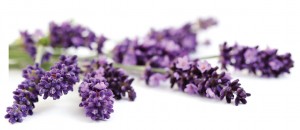 LAVENDER has a fresh, sweet, floral, herbaceous aroma that is soothing and refreshing. Because it is the most versatile of all essential oils, no home should be without it. Lavender is an adaptogen, and therefore can assist the body when adapting to stress or imbalances. It is a great aid for relaxing and winding down before bedtime, yet has balancing properties that can also boost stamina and energy. Therapeutic-grade lavender is highly regarded for skin and beauty. It may be used to soothe and cleanse common cuts, bruises, and skin irritations. Lavender has an approximate ORAC of 3,669 (TE/L). TE/L is expressed as micromole Trolox equivalent per liter.
LAVENDER has a fresh, sweet, floral, herbaceous aroma that is soothing and refreshing. Because it is the most versatile of all essential oils, no home should be without it. Lavender is an adaptogen, and therefore can assist the body when adapting to stress or imbalances. It is a great aid for relaxing and winding down before bedtime, yet has balancing properties that can also boost stamina and energy. Therapeutic-grade lavender is highly regarded for skin and beauty. It may be used to soothe and cleanse common cuts, bruises, and skin irritations. Lavender has an approximate ORAC of 3,669 (TE/L). TE/L is expressed as micromole Trolox equivalent per liter.
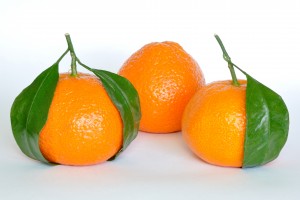 MANDARIN essential oil is extracted by cold expression of the outer peel of the fruit; it has a light, fruity-citrus aroma, similar to that of orange essential oil. Mandarin oil is balancing, uplifting and calming; it is antiseptic, digestive and anti-depressant. Mandarin is also used in soaps, cosmetics, perfumes and as a flavoring agent in liqueurs and confectionery.Mandarin is used in aromatherapy for stomach cramps, indigestion, constipation, depression, anxiety, grief, nervousness, PMS, stretch marks in pregnancy and skin conditions such as acne, oily skin, rejuvenation and mature skin. It is also useful for insomnia, fluid retention, obesity and dejection. Although gentle enough to be used with babies, children and the elderly, use care when using mandarin essential oil in sunlight due to the potential for photo toxicity.
MANDARIN essential oil is extracted by cold expression of the outer peel of the fruit; it has a light, fruity-citrus aroma, similar to that of orange essential oil. Mandarin oil is balancing, uplifting and calming; it is antiseptic, digestive and anti-depressant. Mandarin is also used in soaps, cosmetics, perfumes and as a flavoring agent in liqueurs and confectionery.Mandarin is used in aromatherapy for stomach cramps, indigestion, constipation, depression, anxiety, grief, nervousness, PMS, stretch marks in pregnancy and skin conditions such as acne, oily skin, rejuvenation and mature skin. It is also useful for insomnia, fluid retention, obesity and dejection. Although gentle enough to be used with babies, children and the elderly, use care when using mandarin essential oil in sunlight due to the potential for photo toxicity.
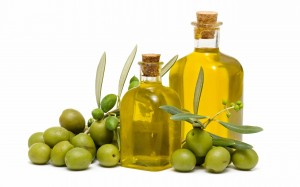 OLIVE OIL is the pure oil obtained from the fruit of olive trees. Extra virgin is the highest quality and most flavorful olive oil classification. In chemical terms it is described as having a free acidity, expressed as oleic acid, of not more than 0.8 grams per 100 grams and a peroxide value of less than 20 milliequivalent O2. It must be produced entirely by mechanical means without the use of any solvents, and under temperatures that will not degrade the oil (less than 86°F, 30°C). In order for an oil to qualify as “extra virgin” the oil must also pass both an official chemical test in a laboratory and a sensory evaluation by a trained tasting panel recognized by the International Olive Council. The olive oil must be found to be free from defects while exhibiting some fruitiness. Since extra virgin olive oil is simply pressed fruit juice without additives, the factors influencing its quality and taste encompass the countless decisions, ethics and skills of the producer, and the terroir itself. The quality of olive oil production- especially the stage of pressing- really does make a difference when it comes to health benefits. Recent studies have compared the anti-inflammatory benefits of extra virgin olive oil (EVOO) obtained from the first pressing of the oil to the anti-inflammatory benefits of virgin olive oils (non-EVOO) obtained from later pressings. What researchers found was an ability of EVOO to lower inflammatory markers in the blood when non-EVOOs were unable to do so. (Study measurements included blood levels of thromboxane A2, or TXA2, and leukotriene B2, or LBT2.) This ability of extra virgin olive oil to help protect against unwanted inflammation is not surprising, since EVOO is known to contain stronger concentrations of phytonutrients (especially polyphenols) that have well-known anti-inflammatory properties.
OLIVE OIL is the pure oil obtained from the fruit of olive trees. Extra virgin is the highest quality and most flavorful olive oil classification. In chemical terms it is described as having a free acidity, expressed as oleic acid, of not more than 0.8 grams per 100 grams and a peroxide value of less than 20 milliequivalent O2. It must be produced entirely by mechanical means without the use of any solvents, and under temperatures that will not degrade the oil (less than 86°F, 30°C). In order for an oil to qualify as “extra virgin” the oil must also pass both an official chemical test in a laboratory and a sensory evaluation by a trained tasting panel recognized by the International Olive Council. The olive oil must be found to be free from defects while exhibiting some fruitiness. Since extra virgin olive oil is simply pressed fruit juice without additives, the factors influencing its quality and taste encompass the countless decisions, ethics and skills of the producer, and the terroir itself. The quality of olive oil production- especially the stage of pressing- really does make a difference when it comes to health benefits. Recent studies have compared the anti-inflammatory benefits of extra virgin olive oil (EVOO) obtained from the first pressing of the oil to the anti-inflammatory benefits of virgin olive oils (non-EVOO) obtained from later pressings. What researchers found was an ability of EVOO to lower inflammatory markers in the blood when non-EVOOs were unable to do so. (Study measurements included blood levels of thromboxane A2, or TXA2, and leukotriene B2, or LBT2.) This ability of extra virgin olive oil to help protect against unwanted inflammation is not surprising, since EVOO is known to contain stronger concentrations of phytonutrients (especially polyphenols) that have well-known anti-inflammatory properties.
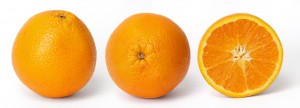 ORANGE essential oil is cold pressed from the peel of the fruit and is tested to verify that it is non-sprayed. The difference in fragrance, from the distilled oil, is significant. Pressed orange oil is sweet and slightly tart. When comparing the three orange oils, it’s easiest to think of sweet orange as being sweet and tart in comparison to the blood oranges being mostly sweet and the blood distilled even more sweet with almost no tartness. Sweet and Bitter Orange essential oils offer a magnitude of health benefits and therapeutic properties. Some of these include: Anti-inflammatory (It provides relief from both internal and external inflammation caused by infections. It is helpful in treating swollen tissue by stimulating blood circulation). Orange essential oil is shown to promote the production of collagen as well as increase the blood flow to the skin. It is helpful at soothing dry, irritated skin as well as acne-prone skin. It is excellent for rubbing on calluses on the feet.
ORANGE essential oil is cold pressed from the peel of the fruit and is tested to verify that it is non-sprayed. The difference in fragrance, from the distilled oil, is significant. Pressed orange oil is sweet and slightly tart. When comparing the three orange oils, it’s easiest to think of sweet orange as being sweet and tart in comparison to the blood oranges being mostly sweet and the blood distilled even more sweet with almost no tartness. Sweet and Bitter Orange essential oils offer a magnitude of health benefits and therapeutic properties. Some of these include: Anti-inflammatory (It provides relief from both internal and external inflammation caused by infections. It is helpful in treating swollen tissue by stimulating blood circulation). Orange essential oil is shown to promote the production of collagen as well as increase the blood flow to the skin. It is helpful at soothing dry, irritated skin as well as acne-prone skin. It is excellent for rubbing on calluses on the feet.
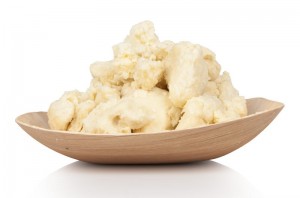 SHEA BUTTER is made from the nut of the African shea tree. It contains a rich amount of unremovable fatty acid which is crucial to rejuvenating and moisturizing the skin. Shea butter provides all the essential vitamins needed to make skin look and feel smoother, softer and most importantly, healthier. It’s therapeutic properties help heal wounds faster. Shea butter stimulates cellular activiry, fights the effects of aging and repairs rough, damaged skin. Shea butter is solid at room temperature although it quickly liquefies right around body temperature. Since Shea Butter is an all natural product, it can vary widely in quality, appearance and smell depending on where it is produced from and how it is refined or extracted. That’s why we use Certified Organic shea butter. Shea butter nourishes the skin with Vitamins A, E and F. Vitamins A and E help maintain the skin and keep it clear and healthy. They are particularly helpful for sun damaged skin. They help prevent premature wrinkles and facial lines. Vitamin F acts as a skin protector and rejuvenator. It soothes rough, dry or chapped skin and helps soften dry or damaged hair. Shea Butter is high in unsaponifiables (a type of fat). Shea Butter has between 7-12% unsaponifiables. For comparison, avocado oil, a well known skin conditioner, has between 2-6%. Also, Shea Butter easily penetrates the skin allowing the skin to breathe and not clogging pores.
SHEA BUTTER is made from the nut of the African shea tree. It contains a rich amount of unremovable fatty acid which is crucial to rejuvenating and moisturizing the skin. Shea butter provides all the essential vitamins needed to make skin look and feel smoother, softer and most importantly, healthier. It’s therapeutic properties help heal wounds faster. Shea butter stimulates cellular activiry, fights the effects of aging and repairs rough, damaged skin. Shea butter is solid at room temperature although it quickly liquefies right around body temperature. Since Shea Butter is an all natural product, it can vary widely in quality, appearance and smell depending on where it is produced from and how it is refined or extracted. That’s why we use Certified Organic shea butter. Shea butter nourishes the skin with Vitamins A, E and F. Vitamins A and E help maintain the skin and keep it clear and healthy. They are particularly helpful for sun damaged skin. They help prevent premature wrinkles and facial lines. Vitamin F acts as a skin protector and rejuvenator. It soothes rough, dry or chapped skin and helps soften dry or damaged hair. Shea Butter is high in unsaponifiables (a type of fat). Shea Butter has between 7-12% unsaponifiables. For comparison, avocado oil, a well known skin conditioner, has between 2-6%. Also, Shea Butter easily penetrates the skin allowing the skin to breathe and not clogging pores.
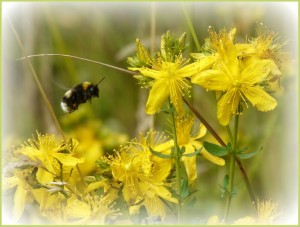 ST. JOHN’S WORT is a common meadowland plant that has been used as a medicine for centuries. Early European and Slavic herbals mention it. The genus name Hypericum is from the Latin word hyper, meaning “above,” and icon, meaning “spirit.” The herb was once hung over doorways to ward off evil spirits or burned to protect and sanctify an area. The species name perforatum refers to the many puncturelike black marks on the underside of the plant’s leaves. Some sources say the plant is called St. John’s wort because it blooms on St. John’s Day (June 24); others say it was St. John’s favorite herb, and still others note that the deep red pigment in the plant resembles the blood of the martyred saint.
ST. JOHN’S WORT is a common meadowland plant that has been used as a medicine for centuries. Early European and Slavic herbals mention it. The genus name Hypericum is from the Latin word hyper, meaning “above,” and icon, meaning “spirit.” The herb was once hung over doorways to ward off evil spirits or burned to protect and sanctify an area. The species name perforatum refers to the many puncturelike black marks on the underside of the plant’s leaves. Some sources say the plant is called St. John’s wort because it blooms on St. John’s Day (June 24); others say it was St. John’s favorite herb, and still others note that the deep red pigment in the plant resembles the blood of the martyred saint.
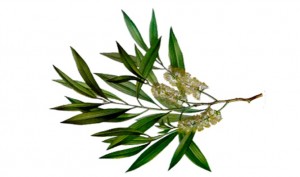 TEA TREE OIL is derived from the leaves of the tea tree. The tea tree was named by eighteenth century sailors, who made tea that smelled like nutmeg from the leaves of the tree growing on the swampy southeast Australian coast. Do not confuse the tea tree with the unrelated common tea plant that is used to make black and green teas.Tea tree oil is applied to the skin (used topically) for infections such as acne, fungal infections of the nail (onychomycosis), lice, scabies, athlete’s foot (tinea pedis), and ringworm. It is also used topically as a local antiseptic for cuts and abrasions, for burns, insect bites and stings, boils, vaginal infections, recurrent herpes labialis, toothache, infections of the mouth and nose, sore throat, and for ear infections such as otitis media and otitis externa.
TEA TREE OIL is derived from the leaves of the tea tree. The tea tree was named by eighteenth century sailors, who made tea that smelled like nutmeg from the leaves of the tree growing on the swampy southeast Australian coast. Do not confuse the tea tree with the unrelated common tea plant that is used to make black and green teas.Tea tree oil is applied to the skin (used topically) for infections such as acne, fungal infections of the nail (onychomycosis), lice, scabies, athlete’s foot (tinea pedis), and ringworm. It is also used topically as a local antiseptic for cuts and abrasions, for burns, insect bites and stings, boils, vaginal infections, recurrent herpes labialis, toothache, infections of the mouth and nose, sore throat, and for ear infections such as otitis media and otitis externa.

